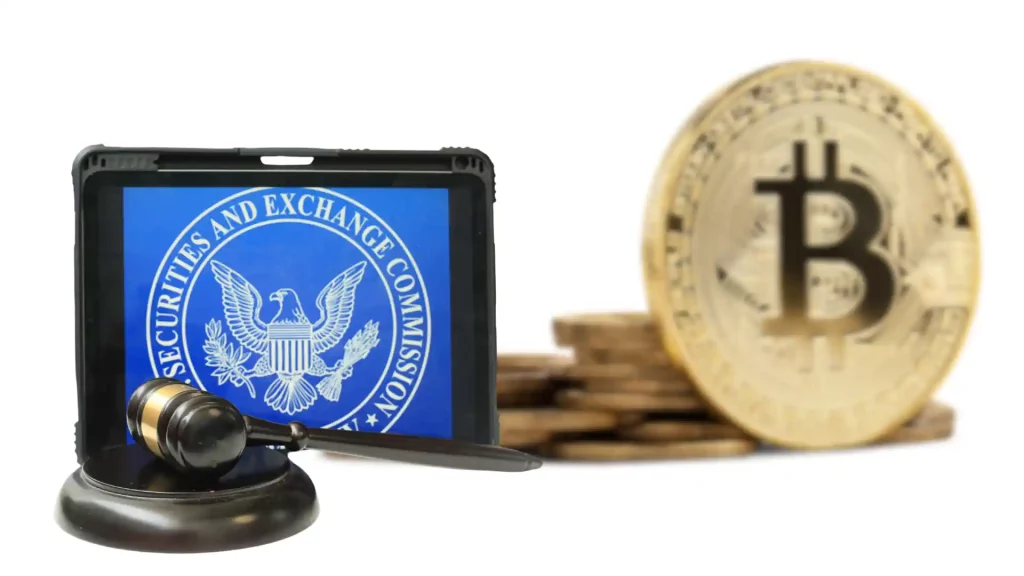An Exchange-Traded Fund, most commonly known as an ETF, acts as an investment vehicle that allows people to invest in assets or a basket of assets without having them physically.
The US Securities and Exchange Commission (SEC) has approved the first-ever US-listed exchange-traded funds (ETFs) designed to track Bitcoin, which could be seen as a significant development for the cryptocurrency ecosystem. This decision brings with it a breakthrough, granting investors a more straightforward avenue to invest in Bitcoin without directly holding the digital asset.
What are ETFs and Why Does this Matter?
An Exchange-Traded Fund, most commonly known as an ETF, acts as an investment vehicle that allows people to invest in assets or a basket of assets without having them physically. Just like the SDPR Gold Shares ETF enables people to invest in gold without actually having or storing gold, these approved Bitcoin ETFs will provide a similar gateway for Bitcoin.
Previously, acquiring Bitcoin necessitated setting up a digital wallet or registration on cryptocurrency exchanges like Coinbase or Binance. Now, with the introduction of these ETFs, the barrier to entry lowers, potentially drawing a more extensive range of investors into the crypto sphere.
Major asset management firms like BlackRock, Fidelity Investments, and Invesco, which have advocated strongly for Bitcoin ETF approvals, are set to manage these newly approved funds. Their involvement underscores the mainstream financial industry’s growing acceptance and interest in cryptocurrency as a legitimate asset class. With SEC’s nod, a competitive landscape is set to unfold as these products are posed to begin trading soon.
Is SEC Happy?
While the SEC’s approval of Bitcoin Exchange-Traded Fund’s indicates a step toward acceptance, the agency remains wary. Gary Gensler, the SEC Chairman, emphasized caution, stating that investors should be mindful of the inherent risks associated with cryptocurrencies. Such sentiments reveal the regulatory tightrope authorities walk- balancing innovation with investor protection. Commissioner Caroline Crenshaw expressed dissent, highlighting concerns about the potential market flooding and its potential impact on vulnerable investors.
The Price Dynamics
The anticipation surrounding Bitcoin ETF approvals has already impacted the cryptocurrency’s valuation. Over recent months, Bitcoin’s price surged approximately 70%, reflecting market optimism about the potential demand these Exchange-Traded Fund’s could generate. In November 2022, following significant setbacks like the FTX exchange bankruptcy, Bitcoin plummeted to $16,000. However, post-SEC approval, the price rebounded to $46,500, indicating renewed investor confidence.
Financial analysts predict varying scenarios concerning Bitcoin’s future price trajectory. Standard Chartered analysts anticipate ETFs could attract between $50 billion to $100 billion this year, potentially propelling Bitcoin’s price to $100,000. Conversely, more cautious estimates suggest inflows around $55 billion over a five-year period. Amidst these projections, a prevailing sentiment underscores the concern that increased exposure through Exchange-Traded Fund’s might introduce excessive volatility into mainstream investment portfolios.
Ethereum’s Ascent in the ETF Era
Beyond Bitcoin, the cryptocurrency market also eyes Ethereum, the second-largest digital currency by market capitalization. Speculation abounds that fund managers may soon launch ETFs centered around Ethereum, mirroring the Bitcoin ETF developments. Such a move would further solidify Ethereum’s position and offer investors additional avenues to engage with cryptocurrencies beyond Bitcoin.
That being said, the SEC’s approval of the first US-listed Bitcoin ETFs represents an important moment for the cryptocurrency landscape, bridging traditional finance with the digital asset realm.
As these ETFs are ready to be launched, they promise increased accessibility for investors while amplifying the ongoing debate about cryptocurrency’s role in mainstream finance.
While the financial industry heralds this development as a milestone, regulatory caution and varying market predictions emphasize the difficulties and uncertainties that lie ahead. As always, investors are advised to approach the evolving cryptocurrency market with caution, understanding both its potential and inherent risks.
